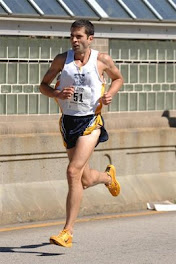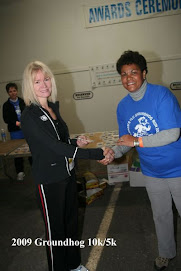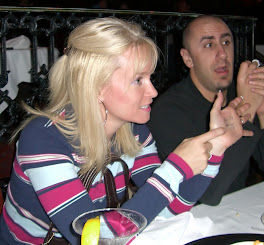I’m flipping through my February 2008 Runner’s World and the catch-word of the issue is “elite.” The cover screams “Elite ABS,” with a picture of Josh Cox sporting a chiseled eigth-wonder-of-the-world marvel above the waist. (Please tell me that photograph has been enhanced. And if it hasn’t, I don’t want to know.) Page 18 touches on the tragedy of Ryan Shay a few months ago, “an elite athlete at the peak of his career…” Page 28 shows Jen Perez, “Elite Triathelete.” The word actually appears three times on page 58. You get the point.
In my quest to define “elite,” I asked around for other runners’ opinions. Here are some of the responses I got:
Dave says: “For me to define an elite runner I compare it to other sports. Elite is obviously those at the top. Where professional sports are involved, it makes it easy: to me an elite golfer is one who is able to make it and survive on the PGA Tour or an elite football player is one who plays in the NFL. Running is different as there really is not a “pro” tour involved with lots of money but here is what I would consider:
- Earn money: be fast enough where when you enter a race, you are in contention or winning the prize money.
- Olympics: make or qualify for the Olympics.
Lastly to be elite, running needs to be more than a hobby. It is basically your full time job. I do not think it would be possible to hold a full time job and then be an elite runner on the side."
Whoa, ok, so these are some pretty high standards. I went into this thinking that elite was a benchmark of a time and a distance sliced by some dimension (male, female, age, etc.) that was achievable if you were in the 99th percentile of runners. But these answers made me wonder just how elite is an elite? Is it really just the top handful of hundreds of thousands—maybe millions—of runners?
So, what’s the point? It made me wonder why is this the catch word du jour? I’ve decided it’s because if the elites are doing it, well… maybe the rest of us should be too. I mean, they were human once too, right? So, what makes them elite? What can we learn from them?
I found some answers in a Shape article back in October 2003 by Eric Harr. He notes that we are inspired: “first, by what top-echelon athletes can do with their bodies; second, by how they stay motivated to stick with a training regimen that makes them seem almost superhuman… In spite of their unique strengths, champions are regular people who face the same motivational ebbs and flows we all do.” Although he’s not talking about elite runners, per se, he captures the spirit of our journey today.
He concludes, “Invest in yourself first every day. Your daily habits determine [what you will become].” If we can take a little piece of their grit, determination and spirit—even if we lack their talent—there’s a better “us” around the corner. So, pick your favorite elite runner. Study them, what they did, what they overcame, how they were motivated, who they were. And draw from it to be better than you were yesterday.














_s_jpg.jpg)









No comments:
Post a Comment